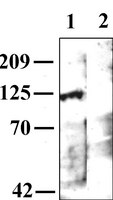Identification and localization of muscarinic acetylcholine receptor proteins in brain with subtype-specific antibodies.
Levey, A I, et al.
J. Neurosci., 11: 3218-26 (1991)
1991
Mostra il sommario
mRNAs encoding five genetically distinct muscarinic ACh receptors are present in the CNS. Because of their pharmacological similarities, it has not been possible to detect the individual encoded proteins; thus, their physiological functions are not well defined. To characterize the family of proteins, a panel of subtype-selective antibodies was generated against recombinant muscarinic receptor proteins and shown to bind specifically to each of the cloned receptors. Using immunoprecipitation, three receptor proteins (m1, m2, and m4) accounted for the vast majority of the total solubilized muscarinic binding sites in rat brain. These receptor subtypes had marked differences in regional and cellular localization as shown by immunocytochemistry. The m1-protein was present in cortex and striatum and was localized to cell bodies and neurites, consistent with its role as a major postsynaptic muscarinic receptor. The m2-receptor protein was abundant in basal forebrain, scattered striatal neurons, mesopontine tegmentum, and cranial motor nuclei; this distribution is similar to that of cholinergic neurons and suggests that m2 is an autoreceptor. However, m2 was also present in noncholinergic cortical and subcortical structures, providing evidence that this subtype may presynaptically modulate release of other neurotransmitters and/or function postsynaptically. The m4-receptor was enriched in neostriatum, olfactory tubercle, and islands of Calleja, indicating an important role in extrapyramidal function. These results clarify the roles of these genetically defined receptor proteins in cholinergic transmission in brain.(ABSTRACT TRUNCATED AT 250 WORDS) | 1941081
 |
Single-step purification of polypeptides expressed in Escherichia coli as fusions with glutathione S-transferase.
Smith, D B and Johnson, K S
Gene, 67: 31-40 (1988)
1987
Mostra il sommario
Plasmid expression vectors have been constructed that direct the synthesis of foreign polypeptides in Escherichia coli as fusions with the C terminus of Sj26, a 26-kDa glutathione S-transferase (GST; EC 2.5.1.18) encoded by the parasitic helminth Schistosoma japonicum. In the majority of cases, fusion proteins are soluble in aqueous solutions and can be purified from crude bacterial lysates under non-denaturing conditions by affinity chromatography on immobilised glutathione. Using batch wash procedures several fusion proteins can be purified in parallel in under 2 h with yields of up to 15 micrograms protein/ml of culture. The vectors have been engineered so that the GST carrier can be cleaved from fusion proteins by digestion with site-specific proteases such as thrombin or blood coagulation factor Xa, following which, the carrier and any uncleaved fusion protein can be removed by absorption on glutathione-agarose. This system has been used successfully for the expression and purification of more than 30 different eukaryotic polypeptides. | 3047011
 |


















